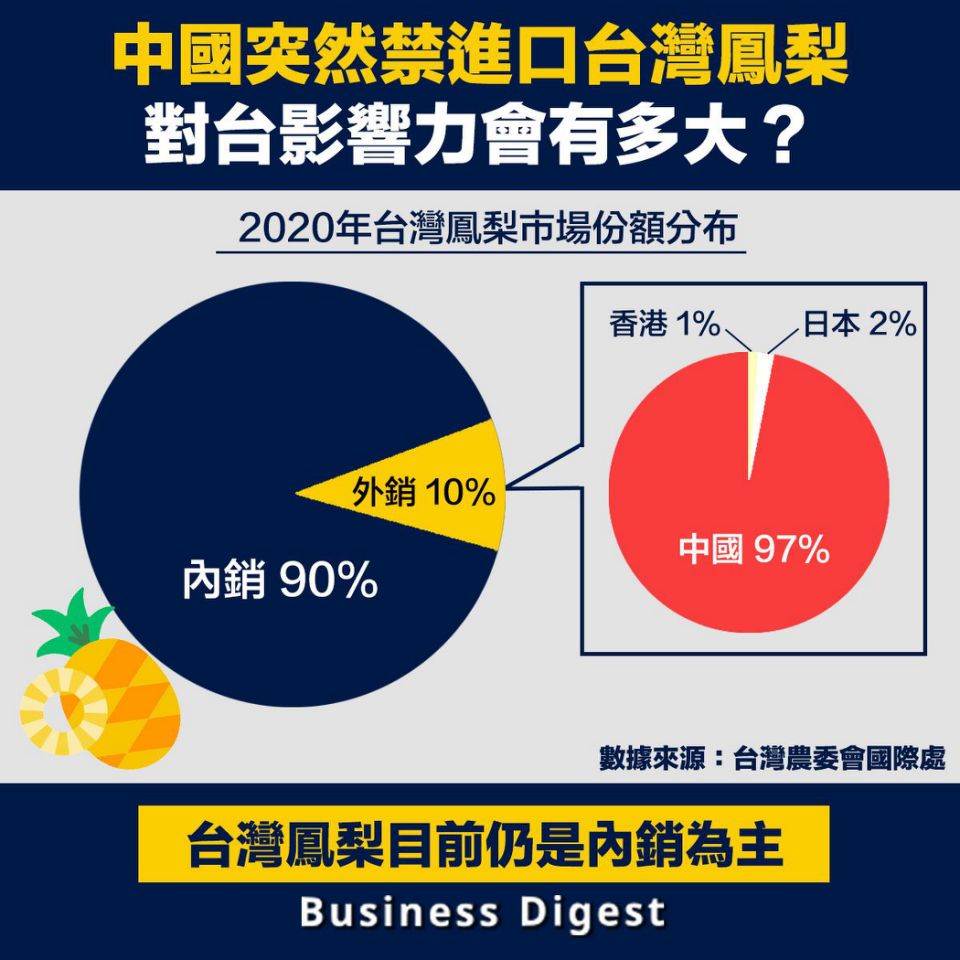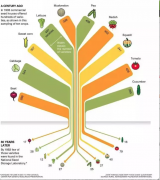If China bans the import of Taiwan pineapples, how much influence will it have on Taiwan?
Recently, the Chinese Customs suddenly announced a moratorium on the import of Taiwan pineapple (pineapple). The notice said that the import of pineapple from Taiwan would be suspended from March 1, 2021, and explained that quarantine pests had been intercepted many times from pineapple imported into the mainland from Taiwan. In order to prevent the risk of plant epidemic at source, the import of pineapple from Taiwan was suspended.

After China suspended the import of pineapples from Taiwan, Taiwan's Council of Agriculture said that it had received notification from China last year that a total of 13 scale insects had been found, but there were also shell insects in China and could not accept the unilateral decision.
So how much influence will China have on Taiwan if it bans the import of Taiwan's pineapple?
According to the statistics of the International Department of the Taiwan Council of Agriculture, the annual output of Taiwan's pineapple in 2020 is about 430000 metric tons, of which 46000 metric tons are exported, accounting for 10 percent of the annual output. Of the exports, 96.9% were sold to China, and about 4 metric tons were sold in the past three years, with an output value of about US $110 million. However, the Taiwan Council of Agriculture estimates that if the land price is stabilized at an average price of NT $21.3 per kilogram in the past two years, it will be able to recover the value lost by this 10% of sales.
It is worth mentioning that Australia has also been subject to unilateral trade sanctions by China in recent years. In May last year, China imposed a punitive tariff of 80.5 per cent on Australian barley imports, but barley exports are expected to soar 64 per cent by October 2021, according to the Australian Bureau of Statistics. After being subject to China's punitive tariffs, Australian barley companies continue to open up new markets and sell them to the Middle East, Japan, and South Asia, and Saudi Arabia is expected to become Australia's largest market.
- Prev

Heard Baotong Temple bell is authentic Hongshan purple seaweed moss Hongshan red purple bolts why so expensive.
Just like Hangzhou is full of Xihu Longjing Tea, but there is a place of origin, the rank is: Shifeng Mountain, Longjing Mountain, Yunqi, Tiger run and Meijiawu. Vegetable moss is everywhere, but Hongshan vegetable moss is the best and most famous, and the frosted Hongshan vegetable moss is the best. Hongshan vegetable
- Next

It is a pity that more than 95% of the old seeds have disappeared from farmland.
More than 10,000 years ago, humans realized that some of the seeds harvested could be retained so that they could be replanted the following year. "Xinyu": people eat meat and drink blood, clothing and fur; as for Shennong, they think that insects and beasts are difficult to feed the people, but they seek edible things, taste the fruits of all kinds of herbs, and observe the bitterness and bitterness of the people.
Related
- A one-day flower show brings 130 million yuan in orders! Nanhai, this Phalaenopsis exhibition is amazing
- What do the flower language and meaning of Lutheran tree mean? Precautions for planting Lutheran tree
- Encounter Chaoshan Kongfu tea, not without this cup of Phoenix single clump
- The durian market in Vietnam and Thailand is flooded. The price of imported durian has plummeted by 30-40% in a month.
- Shanghai solved the problem of local vegetable supply by planting 80,000 mu of green leafy vegetables.
- Wageningen University has become the best agricultural university in the world for the seventh time in a row.
- The strongest export season of South African grapes is full of challenges, with exports to Russia falling sharply by 21%.
- Sri Lanka is on the verge of bankruptcy, "Tea for debt" Organic Agriculture Revolution aggravates the Food crisis?
- Turning waste into earthworm manure and worm manure into organic fertilizer-A new choice for auxiliary farming
- Organic rice growers shoulder the responsibility of nurturing agricultural talents! Yinchuan Sustainable Farm with Organic Life Camp

